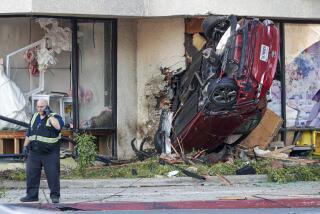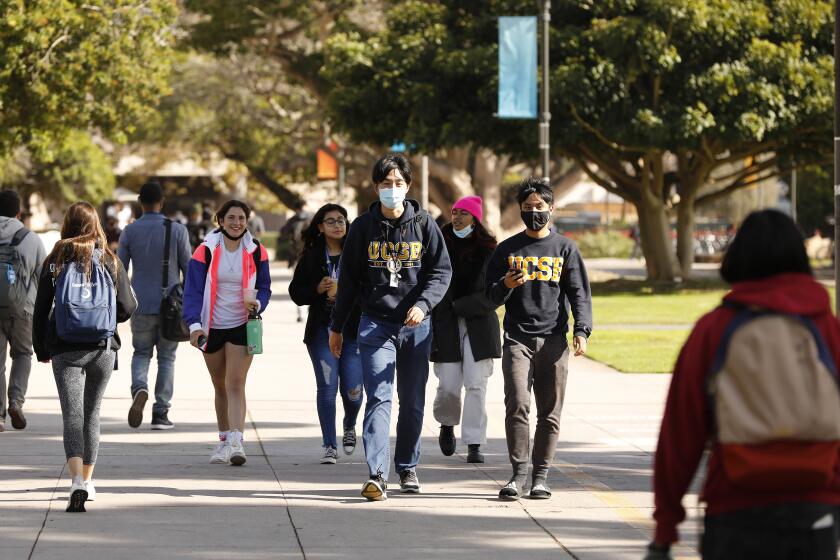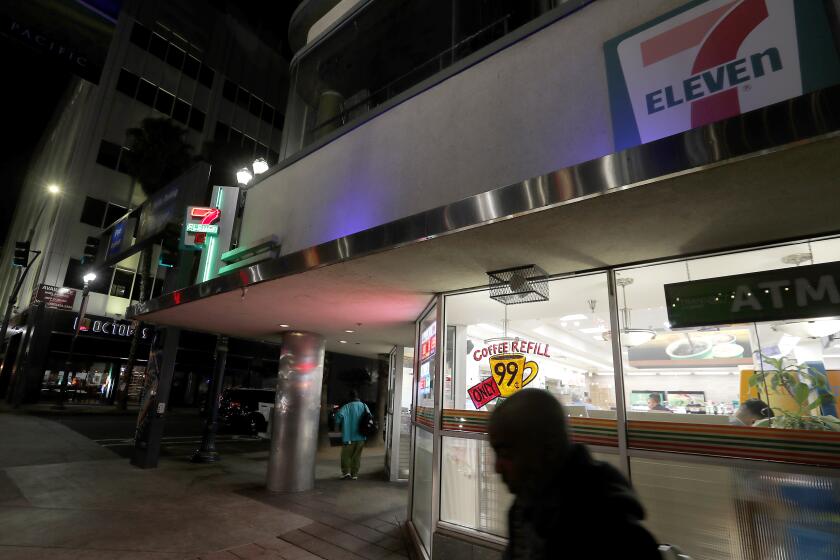DMV Chief Halts Study That Shields Bad Drivers : Safety: All repeat offenders will face the agency’s most aggressive prosecution, he pledges in wake of chronic speeder’s fatal Silverado Canyon crash.
Under fire from legislators and members of the public outraged over this week’s fatal Silverado Canyon car crash, the Department of Motor Vehicles announced Friday it will cancel a 20-year-old research project that examines whether warning letters keep habitually negligent drivers from causing accidents.
Shane Young, 25, who authorities say was driving in a drag race that turned deadly Monday, was unknowingly part of a control group in the study and therefore did not have his license suspended earlier this year despite receiving five traffic tickets in 1993.
Young was released from jail Friday but may still face charges of vehicular manslaughter and drunk driving. He also had his license suspended in 1987 and was caught twice driving without a valid license before his license was reinstated in 1992, DMV records show.
DMV Director Frank Zolin said Friday that the controversy surrounding the Silverado accident prompted him to disband the Negligent Operator Treatment Evaluation System, effective Dec. 31, so all repeat offenders will be subject to the DMV’s most aggressive prosecution.
“It really just seemed unnecessary to continue this ongoing study,” Zolin said, adding that the DMV will do short-term research projects like NOTES as needed. “We do believe the warning letters help, and that’s why we don’t need to do the study anymore.”
Although the chairmen of the state Legislature’s transportation committees welcomed the move, the DMV’s own research director, Raymond Peck, cautioned that without the control group it will be tougher to analyze the impact of the continuing Negligent Operators Treatment System.
Peck, who has worked on both of those research programs since their inception in 1974, pointed out that in the early 1980s DMV revamped the system for warning and suspending bad drivers based on data gathered from the control group.
“We will not be able to tell in future years whether these programs are effective and whether any future changes in the programs are effective,” Peck said. “It’s easy to say, ‘Well, gee, if you had these (control group) people in the (prevention) program, there would have been more accidents prevented.’ But we wouldn’t have known” how to do it without the control group.
Peck and DMV spokesman Bill Madison pointed out that, even if Young had his license suspended as he otherwise would have last spring, it likely would have been reinstated before this week’s accident.
“I’m convinced that this fatal accident would have occurred no matter what we would have done, frankly, because of the nature of this person,” Peck said.
The flap over the NOTES program is the latest in a string of woes for the DMV this year.
In August, a state audit said the agency wasted $50 million on a doomed computer project, and in January an Orange County jury ordered DMV to pay $4.1 million to pedestrians who were hit in a crosswalk by a legally blind motorist whose driver’s license had just been renewed.
“They have no accountability at all,” said Christopher Day, the Tustin attorney who sued the agency on behalf of the pedestrians. “This isn’t the first time their computer has fouled up. There is no computer control whatsoever. There’s no checks and balances in the department.”
Assembly Transportation Committee Chairman Richard Katz (D-Sylmar) called the NOTES program “an abomination” and raised larger concerns about the agency.
“On the items most people come into contact with DMV on, DMV is doing a better job,” Katz said. “But there are significant internal problems, such as computer problems, that they need to be held accountable for.”
But Zolin, the agency director, pointed out that the jury award is being appealed and said that both the computer scandal and the NOTES debacle are problems he inherited when taking over as DMV director 3 1/2 years ago.
Though he admitted that the high-profile problems have hurt the agency’s image, Zolin pointed out the department’s recent accomplishments: designer license plates; magnetic stripes on driver’s licenses that allow for easy identification; colored stripes identifying drivers under 21 and under 18; and a September, 1994, study that showed 65% of the members of the public were happier with their most recent DMV contact than the previous one.
And Zolin stressed that it is impossible for the DMV to prevent accidents--even those caused by people such as Young, who has a long record of speeding tickets.
“There’s no way we can say we guarantee people aren’t going to speed. That’s a matter of individual responsibility,” he said. “We can’t protect the public from the bad judgment of drivers.”
Legislative leaders, however, said the Young case shows DMV’s bad judgment.
The Silverado Canyon resident was randomly selected for participation in the NOTES program, in which 4% of drivers with two tickets within a year were placed into a control group. While the vast majority of these errant drivers received letters warning that they would be suspended if they got additional violations, those in the control group did not, allowing the DMV to study the effectiveness of the warning letters.
Young’s case was even more complicated, because he received five tickets in 1993--which should have prompted immediate suspension of his license--but several of the tickets were processed after he was entered in the NOTES program and thus never counted against him. Plus, his earlier record of license suspension and tickets from 1987, 1988 and 1991 were not considered, Madison said.
“It’s obvious DMV is operating on autopilot and not paying enough attention to public safety at least as far as their research programs are concerned,” Katz said. “It makes no sense that anybody would be involved in (the NOTES program) with a record like this.”
State Sen. Quentin L. Kopp (I-San Francisco), who chairs the Senate Transportation Committee, on Friday called NOTES “a very foolish program” and praised Zolin for disbanding it.
“With any mammoth organism there are mistakes,” Kopp said. “I think the department has improved measurably in terms of service to the customers. . . . I applaud the director.”
* SUSPECT RELEASED
Authorities say they need more time to file charges against Shane Young. B5
More to Read
Sign up for Essential California
The most important California stories and recommendations in your inbox every morning.
You may occasionally receive promotional content from the Los Angeles Times.





